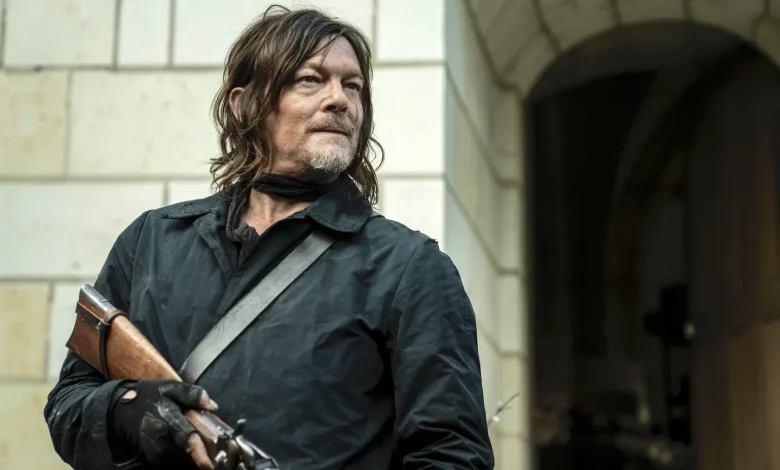The Walking Dead: Daryl Dixon – Hollow but Refreshing

Charlie von Peterffy / Emertainment Monthly Staff Writer
After eleven sprawling seasons of zombie apocalypse-driven moral dilemmas, one of cable TV’s most successful and longest-running dramas, The Walking Dead, ended. In its place, the Walking Dead crew has expanded the franchise in various spinoffs. The Walking Dead: Daryl Dixon, the latest one, follows the titular character and the previous series’ longest-running star as he explores the streets of Paris, France. The new setting adds refreshing elements to the narrative and character formulas for which The Walking Dead became known. While many typical series problems––filler, stock dialogue, unbearable slowness, and hollow subplots and story beats––are still apparent, much of the show has enough new chemistry, solid performances, fresh scenery, and exhilarating thrills to entertain and thought provoke. It provides satisfying character work for Dixon (Norman Reedus) and throws him into unfamiliar contexts and dynamics that elevate the show’s integrity. While Daryl Dixon is sluggish and overstated, it’s also intense, distinct, and slightly elevated by its character-driven core.
After being washed ashore on a French beach, Dixon explores Paris, looking for help. After several minor setbacks and scuffles, he finds a community of nuns who take him in. The group leader, Sister Isabelle (Clémence Poésy), takes him in and explains that more significant conflicts are present within Paris. Dixon is introduced to Laurent, Isabelle’s nephew (Louis Puech Scigluzzi). Dixon learns that Laurent needs to go to a safe zone away from the inner city’s dangers outside of Paris called the Nest, where he will be safe and where Dixon can secure a boat back to the U.S. In his quest to go home, Dixon encounters many new conspiracies, hostile groups, and undead experiments that stand in his way. His empathy, stamina, and morale are put to the test.
Though executed unevenly and occasionally mundanely, Daryl’s narrative is conceptually interesting. Much of what happens on screen is standard or subpar zombie storytelling, with bland dialogue and avoidably hollow story beats. For example, a prominent subplot of the series is religion and God’s existence, as Laurent is seen as the prophesied Chosen One who will save France from the apocalypse because he was born after Isabelle’s sister and his mother became a zombie. Instead of utilizing God and religion as a catalyst for characters’ actions or Laurent’s arc, religion is more a rallying flag to unite the series’ good guys against the villains. Many other subplots and specific moments suffer similarly, as much of the explored societal, moral, and cultural territory has either been seen or is already a given. This makes the show feel lifeless almost half of the time.
Fortunately, the series also has strengths. The overarching narrative––Dixon’s quest to return home, new relationships, Laurent and Isabelle’s complicated history, zombie experimentation and new variants, and Paris’s apocalyptic state––is one of those strengths. The major group conflicts are captivating because each side is headed by (mostly) nuanced, battle-damaged characters filled with convincibly broken or enraged souls. Most of the cast has great chemistry, intensifying each scene’s emotional grit. After so much screen time in the original series, Dixon faces perplexing social dynamics he is unfamiliar with—watching him stumble through Paris and foreign social nuances is amusing (e.g., the French with their subtler mannerisms vs. Dixon’s Americanized bluntness). With each unique experience and interaction, he switches between staying and leaving. Does he belong in that place he once called home (which, franchise fans know, he never really fit into), or can he find more peace under the gaze of the heavily damaged leaning tower of Eiffel? When these conflicts arise, with good acting and zombie fun, Daryl Dixon becomes attention-consuming and thought-provoking. Plus, it’s gorgeously shot. The visuals are colorfully gray, and the makeup and CGI are well-produced, making the show all the more appealing.
Original The Walking Dead fans and newcomers can get plenty to chew on from this latest spin-off. While it wobbles from some banal plotting, an uneven pace, and overstated themes and messages, it builds Dixon, the world of TWD, and more practical points like belonging and finding hope with fairly unwavering forward momentum. It provides decent action and character progression for people to enjoy and think about, though nothing disparate, profound, or consistently entertaining.